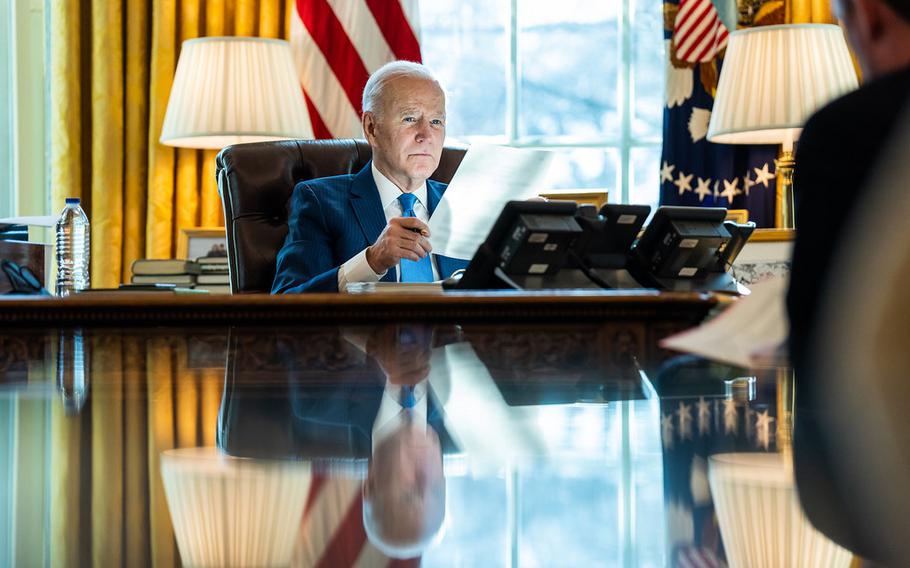
President Joe Biden talks on the phone with King Salman of Saudi Arabia Wednesday, Feb. 9, 2022, in the Oval Office of the White House. (Adam Schultz/White House)
The Biden administration is considering a complete ban on Russian aluminum — long shielded from sanctions due to its importance in everything from automobiles and skyscrapers to iPhones — in response to Russia’s military escalation in Ukraine.
The White House is eyeing three options: an outright ban, increasing tariffs to levels so punitive they would impose an effective ban, or sanctioning the company that produces the nation’s metal, United Co. Rusal International, according to people familiar with the decision-making.
Such a move would have wide-reaching repercussions for the globally traded aluminum market, potentially forcing consumers in the U.S. and other countries into a rush to find replacement metal.
The globally traded aluminum price surged on the news of a possible ban. Aluminum on the London Metal Exchange rose as much as 7.3% for its biggest intra-day gain in almost two weeks amid concerns that such a move would crimp availability. American producer Alcoa Corp. jumped as much as 8.6% while trading of U.S. producer Century Aluminum Co. halted after the sudden move higher.
Russia is the world’s second-largest producer after China of aluminum, which is crucial to most heavy industries. In the U.S. alone, Russian supplies traditionally account for some 10% of total aluminum imports, with data showing Russia was the third-largest exporter to the U.S. in August.
The ban is being considered in response to Russia’s missile attacks on Kyiv and other Ukrainian cities this week that damaged key infrastructure and civilian sites.
The White House, Commerce Department and Rusal’s press service did not immediately respond to requests for comment.
The administration at the beginning of the war held off sanctioning Russian aluminum, fearing it could disrupt global suppliers, people familiar with the matter said at the time.
But with the ongoing war now in its eighth month, there are fewer products left for the U.S. and Ukraine’s allies to ban in response to Russia’s escalations. The discussion by the White House has been ongoing for weeks.
Rusal and other Russian companies have said a ban would destabilize metal markets around the globe.
The debate within the metals industry over how to address Russian supplies has intensified in recent weeks.
The London Metal Exchange, the largest industrial metals exchange in the world, last week launched a discussion paper to determine if the Russian metal should be banned from the bourse.
Alcoa, the largest U.S. aluminum producer, last month sent a letter to the London Metal Exchange that it shouldn’t allow trading of the Russian metal, raising fears it could be dumped to suppress global prices.
The chief executive of Rio Tinto, the world’s second-largest mining company, last month also raised the alarm that unfettered flow of Russian aluminum into the U.S. was making North American producers less competitive.